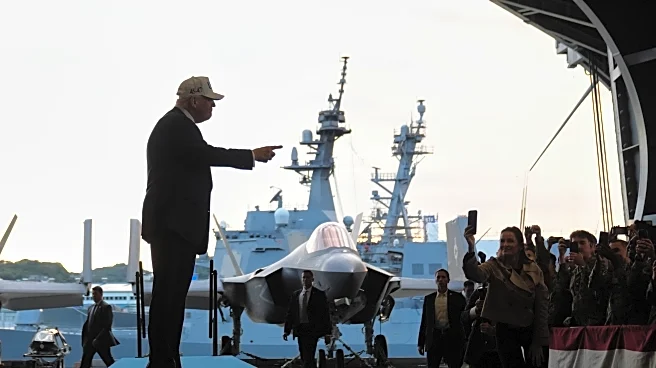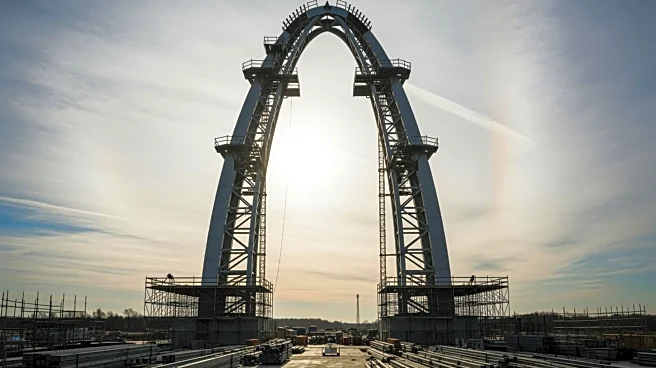WEST PALM BEACH, Fla. (AP) — It wasn’t so long ago that President Donald Trump spoke of building a legacy as a “peacemaker.”
His administration would measure “success not only by the battles we win,” Trump
said in his inaugural address, “but also by the wars that we end — and perhaps most importantly, the wars we never get into.”
But nine months into his second go-round in the White House, Trump is beating a curious path to executing his “peace through strength” foreign policy agenda, a phrase he borrowed from a fellow Republican president, Ronald Reagan, who saw building a strong military and economy as the bedrock to Soviet deterrence.
Trump's take on Reagan doctrine includes sharper threats, bombings and no shortage of bravado.
It’s too soon to tell how history will judge Trump’s version, but the Gipper had his doubters, too.
“There are a lot of people who would have given Reagan a not-passing grade around 1983 or so,” said University of Tennessee scholar Andrew Busch, noting the year that Reagan ordered the U.S. invasion of a Caribbean island, Grenada. “By 1989, when he left office, they would say, ‘Wow, that guy was like the biggest peacemaker in the 20th century in some ways.’”
Trump's unique approach to Reaganesque diplomacy was on full display during his trip to Asia this past week.
As he made his way to Kuala Lumpur, Malaysia, for the Association of Southeast Asian Nations summit, Trump announced via social media that he was canceling trade talks with Canada and imposing another 10% tariff on imports of Canadian goods. He expressed outrage over a television ad — paid for by the Canadian province of Ontario — that used a spliced audio of Reagan criticizing tariffs and aired during the World Series.
Then as Trump met with leaders in Malaysia and South Korea, the U.S. Navy carried out more lethal strikes on suspected drug boats in the Pacific.
His administration moved to shift the USS Ford and thousands of additional sailors from the Mediterranean toward the Caribbean Sea waters near Venezuela, continuing the biggest U.S. troop buildup in Latin America in more than 50 years.
Trump wasn't done.
Minutes before a critical meeting with Chinese President Xi Jinping on Thursday, Trump took to social media to suggest he was preparing to discard a decades-old U.S. prohibition on testing the nation’s nuclear weapons.
Later, as he made his way back to Washington, Trump was coy on whether he really meant to say he was ordering the resumption of explosive testing of nuclear weapons — something only North Korea has undertaken this century -- or calling for the testing of U.S. systems that could deliver a nuclear weapon, which is far more routine.
He remains opaque about whether he intends to resume underground nuclear detonation tests.
“You’ll find out very soon,” Trump told reporters aboard Air Force One on Friday, as he headed to Florida for a weekend stay.
Defense Secretary Pete Hegseth is not shedding light on what kind of testing the administration planned to undertake. But he is reiterating Trump's Reagan-borrowed mantra.
“America will ensure that we have the strongest, most capable nuclear arsenal, so that we maintain peace through strength,” Hegseth said Friday. “That’s what this is. In every meeting, that’s what we talk about: Peace through strength.”
While the loose talk about nuclear testing was certainly unsettling to some, reaction appeared to be relatively measured. Trump, after all, has made many pronouncements only to later make pronounced shifts in positions.
For example, in a matter of weeks recently, he went from maintaining Ukraine must cede land to Russia to proclaiming that he believed Kyiv could win back all of the land lost in the war to declaring “fighting should stop at the lines they are at now.”
Administration officials are loath to question Trump’s tactics but acknowledge that some may appear to be contradictory, particularly with what seem to be spur-of-the-moment reversals in his public statements.
Rather than regard these abrupt changes in course as defects, administration officials privately argue that they give the U.S. more influence and make adversaries and potential adversaries — not to mention allies and partners — more wary to cross Trump.
But policy consistency has long been regarded as key in national security and international relations, not least because it provides a concrete basis for international understandings and actions that other countries consider when making their own decisions.
“This is a product of a lack of process,” said Ian Kelly, a retired career diplomat who served as U.S. ambassador to Georgia in Trump’s first term. “It’s a classic top-to-bottom operation and there doesn’t seem to be any consultation with other stakeholders, especially with Congress, but also long-standing allies.”
Trump has managed to grasp tightly onto the “peacemaker” title even as his administration has carried out an activist foreign policy in the early going of his second term.
Trump claims as a shining achievement his decision to order strikes in June on three critical Iranian nuclear facilities that he says “obliterated” the Iranian program. The bombing caused significant damage in an operation in which no American troops were harmed.
While Trump insists the program was destroyed, the head of the U.N. nuclear watchdog said this week that renewed movement has been detected recently at Iran's nuclear sites.
Before those strikes, some of Trump’s die-hard backers, including Steve Bannon, Rep. Marjorie Taylor Greene, R-Ga., and commentators Tucker Carlson and Charlie Kirk, expressed consternation as Trump mulled military action. They pointed to Trump’s own wariness over decades of war fomented in previous administrations.
Trump's strikes in the Caribbean appear to be landing huge blows to Venezuelan drug smugglers and unsettling the government of President Nicolás Maduro. At the moment, that seems to be coming with “very little political cost” for Trump, said Justin Logan, director of defense and foreign policy studies at the Cato Institute, a libertarian think tank in Washington.
But Logan argues that Trump should be careful as he ponders the path ahead in Venezuela and steer clear of the pitfalls of the “endless wars” in Iraq and Afghanistan that left an indelible mark on the American psyche. This one would be in his own backyard.
“This administration seems to favor these short, sharp strokes and then say they have resolved the problem altogether,” Logan said. “I’m afraid what will happen is that we will discover that none of these problems have actually been put to bed.”
—-
Finley and Lee reported from Washington.










